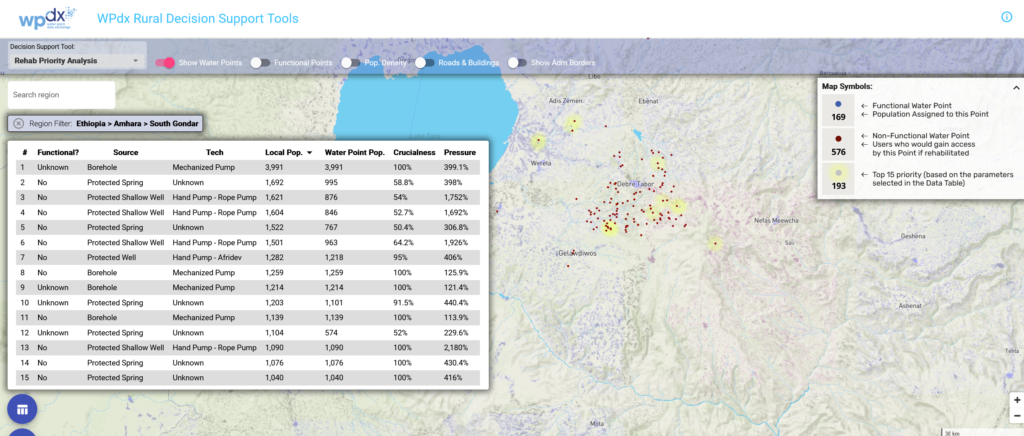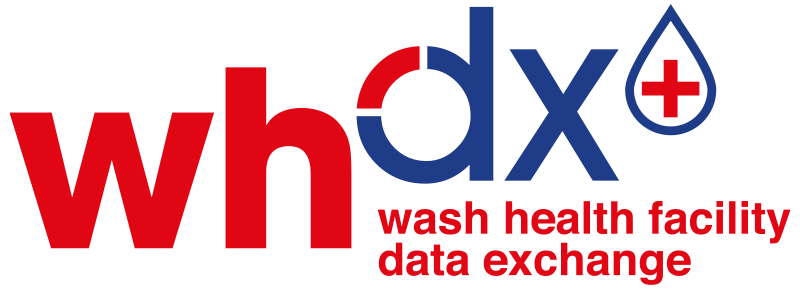Contributed by Tedla Mulatu, Ethiopia Country Director, Millennium Water Alliance
The Millennium Water Alliance (MWA) has been implementing a five-year Water, Sanitation and Hygiene (WASH) Program in three target districts in Amhara National Regional State (ANRS) of Ethiopia since April 2019. With generous funding support and partnership from the Conrad N. Hilton Foundation, MWA and its program partners have prioritized water supply monitoring system as one of the key pillars of the five-year program. Other key program components include WASH in Health Care Facilities, WASH in Schools, Water Quality Improvement using Dispensers for Safe Water (DSW), Community Water Supply System Development and Capacity Development activities.
The Water Point Data Exchange (WPdx) has been included as a supplement to the WASH program since 2020 whereby the community level water monitoring data has been uploaded in the WPdx platform. Prior to uploading the water point data from the target districts, which include Dera, Farta, and North Mecha an appropriate process has been followed through MWA to secure the buy-in of the government of Ethiopia at all levels. Accordingly, the Water Development Commission granted a letter of support addressed to NGOs working in the WASH sector to share their respective water point data through the WPdx platform. This recommended step from the government has been a key milestone for MWA and Global Water Challenge (GWC) to collaborate further in training NGO and government partners on the utilization of WPdx with a focus on its decision support tools. The decision support tools of WPdx assist in the prioritization, resource allocation, and identifying target areas for water point construction and rehabilitation. The training and follow up support provided by MWA and GWC has resulted in the uploading of more than 20,000 water point data records from Ethiopia. [Please see this blog post which outlines the initial engagement with WPdx.]
Beyond supporting the upload of water point data, MWA has been spearheading the training and awareness creation about WPdx in Ethiopia. This engagement has included the use of WPdx decision support tools in the prioritization of activities for the upcoming Year IV Annual Plan (April 2022 – 2023). For instance, during the annual reflection and learning workshop convened by MWA, the decision support tools were utilized for the analysis of rehabilitation of existing water points versus resource allocation for the construction of new community water points. The discussion has been relevant to demonstrate the importance of rehabilitating existing water points to regional and district government. According to the government’s guidelines, rehabilitation of water points must be done by user communities and NGOs are not advised to intervene in the maintenance and rehabilitation work of community water points.
A specific case used for prioritization of rehabilitation over new water point construction has been in Dera district where Food for the Hungry (FH) implements a range of activities as part of the MWA collaborative program. Whereas ANRS has been skeptical about the intervention on water point rehabilitation and major maintenance support provided by FH in selected communities, the results presented and discussed provided a convincing justification for the inclusion of water point rehabilitation and major maintenance support through a detailed analysis of the number of beneficiary communities that would benefit from construction of new water supply system versus rehabilitation of existing water systems. FH has rehabilitated about 65 water sources for the past three years which benefited more than 15,700 community members within the woreda and also resulting in a reduction of non-functionality rate from 24% to 9.5%.
Whereas the government guidance is to build the capacity of water user communities to maintain and rehabilitate their water system, the analysis done has justified the importance of rehabilitating selected existing water system for selected communities. This plan was discussed and agreed during the annual reflection and learning workshop held in March 2022.

The WPdx Rehabilitation Priority Analysis calculates how many people would gain access to a specific water point if it were to return to a functional status and highlights top priorities based on selected criteria. Rehabilitation of existing water points is generally much more cost-effective than constructing new water points.
